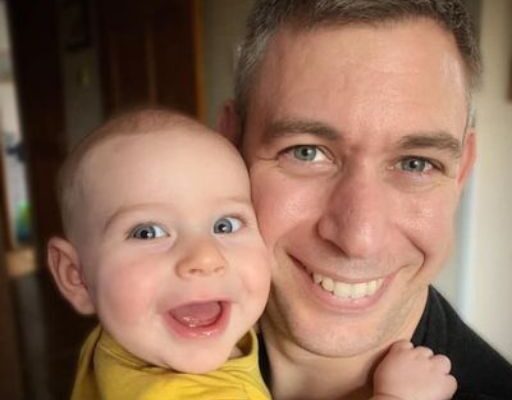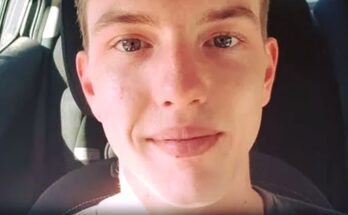MY SON WAS BORN IN A COMA—AND NOW HE WON’T STOP SMILING
The delivery room went from quiet nerves to full-blown panic in under a minute.
I remember hearing the words “no heartbeat” and then everything got blurry—machines beeping, nurses rushing, my partner squeezing my hand so hard I couldn’t feel my fingers. Then, silence.

He came out completely still. No cry. No movement. Just this tiny, beautiful body that looked like it was sleeping.
But he wasn’t sleeping.
He was in a coma.
They rushed him away before I could even process what was happening. I didn’t get to hold him. Didn’t get to kiss his forehead. Just watched the back of his incubator disappear down a hallway.
We didn’t know if he’d wake up. For hours. Then days. They kept using words like “neurological risk” and “wait and see.” I sat next to his little hospital crib every day, reading books, humming songs, whispering how much I loved him—even when I wasn’t sure he could hear me.
And then on the fourth day, something miraculous happened.
His fingers twitched.
’d been watching him closely, my heart in my throat, every second feeling like an eternity. But that one little movement, that small twitch, was enough to make me gasp in disbelief. I leaned in closer, my breath catching. Maybe he was hearing me. Maybe my words were reaching him. Maybe—just maybe—there was hope.
The doctors were cautiously optimistic when I told them. They assured me it was a good sign, but they didn’t want to get my hopes up too high. They still couldn’t promise anything. But I held onto that moment, letting it fuel me through the endless days that followed.
The following week, my son, Adam, started showing more signs of life. He began to open his eyes, though it wasn’t with focus or recognition. But it was progress. He could move his fingers and his toes, and slowly, bit by bit, he started to respond to my voice. Sometimes he would blink when I called his name, or his hand would twitch when I gently stroked it. The doctors still cautioned me, telling me not to expect a miracle, but they couldn’t deny the small improvements.
A week later, Adam started making actual noises—soft sounds, not quite cries, but definitely attempts to communicate. I remember the first time I heard it. I was sitting beside him, my hand resting on his, when he made a soft, gurgling noise. I froze, my heart leaping in my chest. It wasn’t much, but it was something. It was real. It was hope.
And then came the smile.
It happened one afternoon, almost exactly two weeks after he was born. I was talking to him softly, telling him about the world outside the hospital walls, telling him how much I loved him and how everyone was waiting to meet him. I paused for a moment, trying to catch my breath, when I saw it. His tiny lips curled upwards, just for a second.
At first, I thought it was a reflex, a fluke. But when I spoke again, his lips curled once more, and then I saw his eyes, staring at me with an intensity I hadn’t expected. They were still unfocused, but there was something there. A connection.
“Adam,” I whispered, my voice breaking with emotion. “You’re here. You’re really here.”
I couldn’t believe it. My son, my beautiful boy, was smiling.
From that moment on, it was like a switch flipped. Every day, Adam would smile more and more, responding to my voice, to the sound of my touch, to the feel of my presence. It was as if he had been in the coma all this time, waiting for the right moment to return to us. And when he did, he came back with an overwhelming joy. It was as though all the love and tenderness in my heart had created a bond so strong that he couldn’t resist but smile in return.
But it wasn’t just his smile that was strange. It was the way he smiled, so big and so often. He smiled at everyone—the nurses, the doctors, even strangers who passed by his incubator. It wasn’t just a smile; it was a grin, like he knew a secret. People started commenting on it.
“Your baby is the happiest baby we’ve ever seen,” the nurses would say. “I’ve never seen a newborn smile like that before. It’s incredible.”
It was incredible, and a little unnerving.
A miracle. I clung to that word, letting it fill me with hope. But deep down, a part of me couldn’t shake the feeling that there was something more at play, something I couldn’t quite put my finger on.
The smiles, though, were hard to ignore. Every time I looked at him, he would be grinning—like he had a secret only he knew. I started to wonder if this was just a natural reaction to the stress of being in a coma for so long, or if maybe—just maybe—he was trying to tell me something.
Then came the day the doctors told me that Adam was going to be fine. No permanent damage. He was going to grow up just like any other child. I remember that moment so clearly, how it felt like a weight was lifted off my chest. My son was going to live.
But as Adam grew, the smiles didn’t stop. If anything, they got more intense. He smiled at everyone, at everything. His face lit up like the sun, and people who met him couldn’t help but comment on his joyful nature.
“Your son has a gift,” people would say. “He’s just radiating happiness. It’s contagious.”
And it was. People started coming to see Adam. Friends, family, even strangers. Everyone wanted to meet the baby who smiled all the time. He made them feel something—a warmth, a connection, a reminder that sometimes, happiness can be so simple.
But there was one person who stood out among the rest—the pediatrician who had been overseeing Adam’s recovery. She came in one day, a quiet look on her face, and asked if she could speak with me privately. I agreed, but I had no idea what she was about to tell me.
“I’ve been researching Adam’s case,” she said. “And I’ve spoken to several of my colleagues about him. We’re all astonished by his recovery, but there’s something… unusual.”
I blinked, a knot forming in my stomach. “Unusual? What do you mean?”
“It’s his emotional state. It’s like he’s not just happy—he’s completely in tune with the people around him. It’s almost as if he can sense their feelings. It’s not typical for a baby his age to have such an emotional awareness. His smiling, it’s not just random. It’s almost as if he’s sharing a piece of himself with the world. And the thing is, it’s not just making people smile—it’s healing them.”
I stared at her in disbelief. “Healing them?”
“Yes. There have been several cases where people who’ve met Adam report feeling a sense of peace, a relief from their own worries and sadness. It’s like his joy is contagious in a deeper way than we understand. We can’t explain it, but we’ve seen it happen.”
I didn’t know how to respond. I wanted to laugh it off, but something inside me told me to take her seriously. Adam’s smiles weren’t just changing his life—they were changing the lives of everyone around him.
Over the next few months, Adam’s gift continued to touch everyone he met. People would leave his room with tears in their eyes, smiling, feeling better than they had in years. It was as if his presence alone was enough to remind them of the good in the world.
And then came the karmic twist. One of the strangers who had visited Adam, a woman who had been struggling with depression for years, came back to thank me. She told me that after meeting Adam, she had felt an overwhelming sense of peace and joy that had stayed with her for days. She had never felt anything like it in her life.
“I don’t know how to explain it,” she said. “But your son saved me. He gave me hope again.”
The woman’s words struck me deeply. It was then that I realized—Adam wasn’t just a miracle for me. He was a miracle for everyone. His smile, his joy, was more than just a response to his own survival—it was a gift to the world.
The lesson I took from all this was simple, yet profound: sometimes, the most powerful thing you can give the world is your own happiness. Adam had no words, no grand gestures—just a smile that made everyone around him feel better, feel lighter, feel like there was good in the world.
It was a reminder that even in the darkest of times, there is always light to be found, and that sometimes, healing comes from the simplest, most unexpected places.
Please share this story with someone who needs a reminder that even the smallest acts of joy can change the world. And don’t forget to like this post if it touched your heart.



